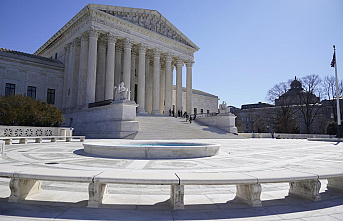Concerns that America may not be paying enough attention to Russia's invasion in Ukraine have been fuelled by the U.S. concern and support for NATO's presence there. Blinken's trip to Israel was delayed several times because of developments in Ukraine. He was due to arrive in Israel Saturday morning from Warsaw, after a break from President Joe Biden’s Ukraine-dominated visit in Belgium and Poland.
Blinken's visit coincides with talks to save a historic nuclear deal from Iran being scuttled amid concerns in Israel and the Gulf Arab countries that such an agreement might not be strong enough to stop Tehran's regional aggression.
Israel strongly opposed the 2015 Iran-world powers agreement and supported Donald Trump's unilateral withdrawal from it. Israel warned against the reactivation of the agreement and said it would not be bound by any new one.
To underscore regional concerns, Israel's government has quickly organized a meeting with top diplomats from Arab countries who have normalized relations. Blinken, the Israeli Foreign Minister Yair Lepid, and their counterparts from Bahrain (Morocco) and the United Arab Emirates will also be present.
These three countries established normal relations with Israel in 2020 under the so-called Abraham Accords, which were mediated by Trump's administration. Representatives from Jordan and Egypt, which were the first Arab countries to recognize Israel in 2020, will attend the gathering at the Negev Desert kibbutz. This is where David Ben-Gurion, Israel's founding father, spent his retirement years.
The Abraham Accords were one of Trump's few foreign policy initiatives that the Biden administration praised and they expressed an interest in negotiating more, despite the reticence from the Palestinians. They have seen unhappily how Arab countries recognize Israel, while their status with Israel remains disputed.
The U.S. has stated repeatedly that it supports a two state solution to the Israeli-Palestinian war. After meeting Naftali Bennett, the Israeli Prime Minister, Blinken will be in Ramallah on the West Bank to meet Mahmoud Abubas, the Palestinian President, to confirm this position.
Iran and the uncertain status in the nuclear negotiations at Vienna may be of greatest concern to Israel and its neighbours, but the war in Ukraine as well as efforts to persuade Russian President Vladimir Putin not to invade are much more pressing.
This conflict has caused turmoil in the world's energy markets, leading America and Europe to appeal to Arab oil suppliers to increase production. There could be major food security issues in the Middle East due to the war, especially since it imports large quantities of Ukrainian grain.
Bennett tried to portray himself as a mediator between Putin and Ukraine, but his talks with the Russian leader are still in vain. According to U.S. officials, Blinken is open to discussing possible roles Israel, which has concerns over Russia's presence in its northern neighbor Syria.
Since the beginning of hostilities last month, Israel has had to walk a fine line between Russia & Ukraine. Bennett expressed support for Ukraine's people, but did not condemn Russia's invasion.
Israel conducts regular airstrikes against what it considers hostile Iranian military targets within Syria. These strikes should be coordinated with Russia. Russia intervened in Syria’s civil war in 2015. Russia is also a participant in the Iran talks.
Blinken will depart Israel for Morocco and Algeria. Blinken will meet with Abu Dhabi's Sheikh Mohammed bin Zayed Al Nahyan (de facto leader) and other Moroccan officials in Rabat.
Bennett is a major player in the region. He met Bennett and Egyptian President Abdel-Fattah el-Sissi this week in Egypt, as well as Jordan's King Abdullah II, Mustafa al-Kadhimi, and Jordan's Prime Minister Mustafa al-Kadhimi.
However, he upset the United States by hosting Assad recently, drawing a sharp rebuke in Washington. The U.S. stated that the meeting was inappropriate given Syria's civil conflict and that it should not be business as usual with Damascus.
This was Assad's first visit to an Arab country since 2011's uprising in Syria. The UAE, a U.S. ally, and driving force behind Abraham Accords has tried to avoid provoking Russia.












